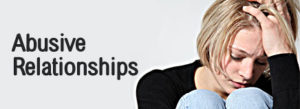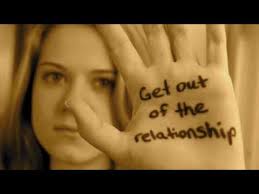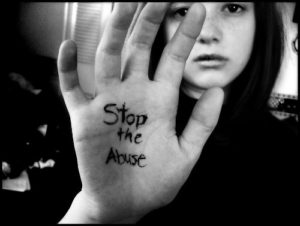Am I In an Abusive Relationship?
No matter how attractive, educated, wise, or smart a person is, he or she can be a victim of an abusive relationship. Trigger warning ahead, please read this article knowing that an emotional reaction is a possibility.

There is no one single key thing that you can say, yes, that, that right there means my partner is abusive. Abuse, whether emotional, physical, mental, psychological or financial comes in many forms.
The purposes of that abuse is for one purpose only and that is to gain and maintain total control. There is no “playing fair” in an abusive relationship. An abuser will use fear, guilt, shame, and intimidation in order to wear you down and keep you under his or her thumb. He or she may threaten you, hurt you, or hurt those around you.
Domestic violence and abuse do not discriminate. Abuse can happen in heterosexual as well as same-sex relationships. The abuse can happen regardless of age, ethnic background, and economic level. Keep in mind that while women are the more common victims of abusive relationships, men are also abused – most especially verbally and emotionally.
Warning Signs of Abusive Relationships
Isolation
An abuser wants to isolate you from friends or even family. An emotionally abusive spouse wants you all to themselves. They don’t want any outside influences to pull you away from the relationship and their control. If your partner prevents you from seeing friends and family, it might be a sign of an emotionally abusive relationship.
Verbal Abuse
Name calling, even “joking”, isn’t appropriate. This is meant to hurt you and keep you in line. Abusers will occasionally cover themselves and their behavior by laying the blame at your feet by saying that you need to lighten up or that you are overly sensitive. Know this, you are not too sensitive; what you are feeling is your gut telling you that this is not the way you should be treated.

Blame
If your significant other is often blaming everything on someone else, but most especially you, this is a bad sign. Never taking responsibility for their own behavior or admitting that they are at fault is not a part of a healthy relationship. If there are tantrums it will most likely be blamed on you, you might hear, “You made me do it.”
Fear and Intimidation
Feeling fearful or feeling intimidated around your significant other is a very telling sign that they are abusing you. Abusers try to intimidate with violence, dominance, and displays of power. Intentionally putting you in possibly harmful situations is an indicator of abusive behavior.
Punishment for Time Away
Abusers want you and your attention all to themselves; it goes hand in hand with the isolation mentioned above. If you go somewhere without telling them, or worse, without their permission, perhaps even if you come home late, you are punished. The punishment could be withholding of love, verbal attacks, even physical violence.

Subservience Without Reciprocity
Abusers are often entitled. They feel like the world and everyone around them owes them. Thus the abuser wants you to be a willing servant. He or she expects you to do everything and will not help at all. They may even accuse you of weakness for needing that help.
Jealousy
One of the most noticeable traits of an abuser is their jealous behavior. They could be jealous of the time you spend at work, with others, away from the relationship. They may see something that isn’t there, accuse you of an affair. An abuser could be jealous, even, of you, your accomplishments, a raise or corner office. This aspect of their behavior stems from the lack of control they feel over those aspects of your life.
They Make You Feel Guilty
An abuser is a master manipulator and will use this against you. They will sulk, threaten to leave, and emotionally punish you for a myriad of things. Most especially for not falling in line with their desires. An abusive partner will attempt to make you feel guilty any time you try to exert your own will. There may even be times that he or she appears to be apologetic for their behaviors and loving; the abuse begins again when the abuser feels he or she has your forgiveness.

Things Get Physical
Ok, so obviously hitting someone is abusive, but if you think about it physical abuse can start out simply. Examples might be intimidating posturing, grabbing, or controlling your movements and space. Keep in mind that if you are in an emotionally abusive relationship, there is a strong possibility that things may get physical. At first, the abusive partner might pull your hair, push you, or grab you so hard that you bruise; these may only be warning signs that things can escalate further.
Where To Get Help
If any of this sounds even remotely familiar, know this. There is help out there and you do not have to remain in an abusive relationship.
Help for women:
In the US: Call the National Domestic Violence Hotline at 1-800-799-7233 (SAFE).
In Canada: Visit ShelterSafe to find the helpline of a women’s shelter near you.
UK: Call Women’s Aid UK at 0808 2000 247.
Ireland: Call Women’s Aid at 1800 341 900.
Australia: Call 1800RESPECT at 1800 737 732.
Worldwide: visit International Directory of Domestic Violence Agencies for a global list of helplines and crisis centers.
Help for men:
In the US and Canada: Call the National Domestic Violence Hotline at 1-800-799-7233.
UK: Call the ManKind Initiative at 01823 334244.
Ireland: Call AMEN at 046 902 3710.
Australia: One in Three Campaign
The bottom line is that abusive behavior is never acceptable, whether it’s coming from a man, a woman, a teenager, or an older adult. You deserve to feel valued, respected, and safe.
If you are in an abusive relationship seek help. If you need help leaving an abusive relationship reach out.
Leave me a comment and let me know how you’re doing on the Accelerated JoyWorks Facebook page. You can also let me know if you have a subject you would like me to address in the next article. Feel free to share this article with your friends and family or anyone whom you think might benefit.
